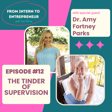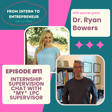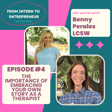
Episode 3 - Being A Heart Centered Therapist with Sindee Gozansky
Sindee Gozansky, LCPC, is a therapist with over 18 years of experience in the mental health field. She holds a master's degree in clinical mental health and rehabilitation counseling, and her dedication to helping others has been the driving force behind her successful career.
From her early days in community mental health to establishing a thriving private practice in 2011, Sindee's journey has led her to become the proud owner of a group practice based in Maine. Through her practice, A Simple Therapy, LLC, she has been able to fulfill her passion for therapy and provide accessible mental health treatment to individuals across the state.
In addition to her clinical work, Sindee is deeply committed to mentoring the next generation of therapists. Over the past 5 years, she has served as an internship training site, offering guidance and support to master's level students embarking on their own counseling journeys.
Her most recent endeavor, The Heart-Centered Therapist Podcast, reflects her unwavering dedication to cultivating connection, enhancing therapist identity, and promoting mastery among fellow professionals. Through this platform, Sindee strives to share valuable insights and empower therapists in their journey to make a positive impact on the lives of others.
Connect with Sindee:
Podcast: The Heart-Centered Therapist Podcast:
https://podcasts.apple.com/us/podcast/the-heart-centered-therapist-with-sindee-
gozansky-lcpc/id1660648538
FB Group: The Heart-Centered Therapist Community: Supporting Therapist Life and Work:
https://www.facebook.com/groups/478651669638167
Mental Health Threads Boutique: https://mentalhealththreads.com/













